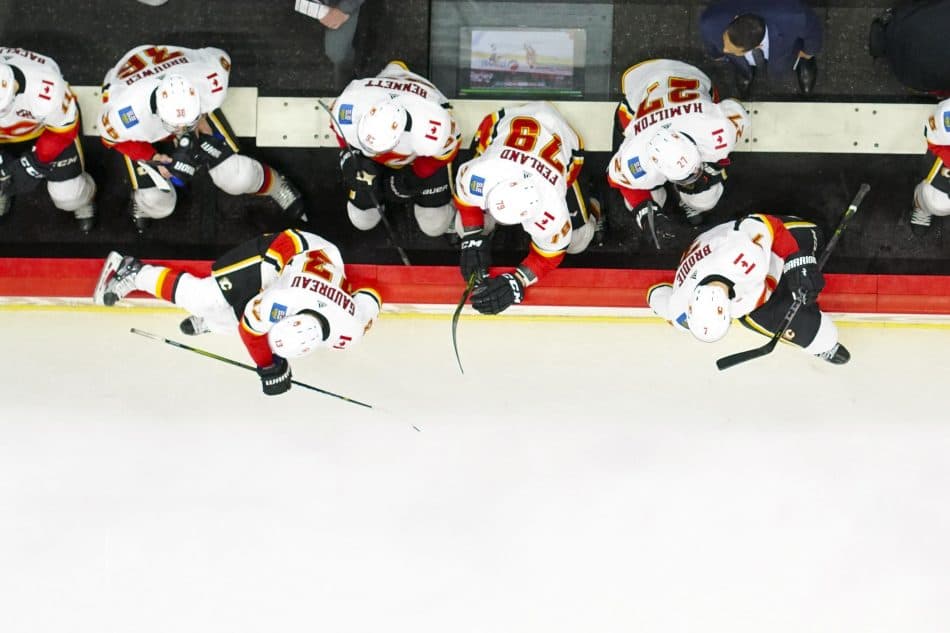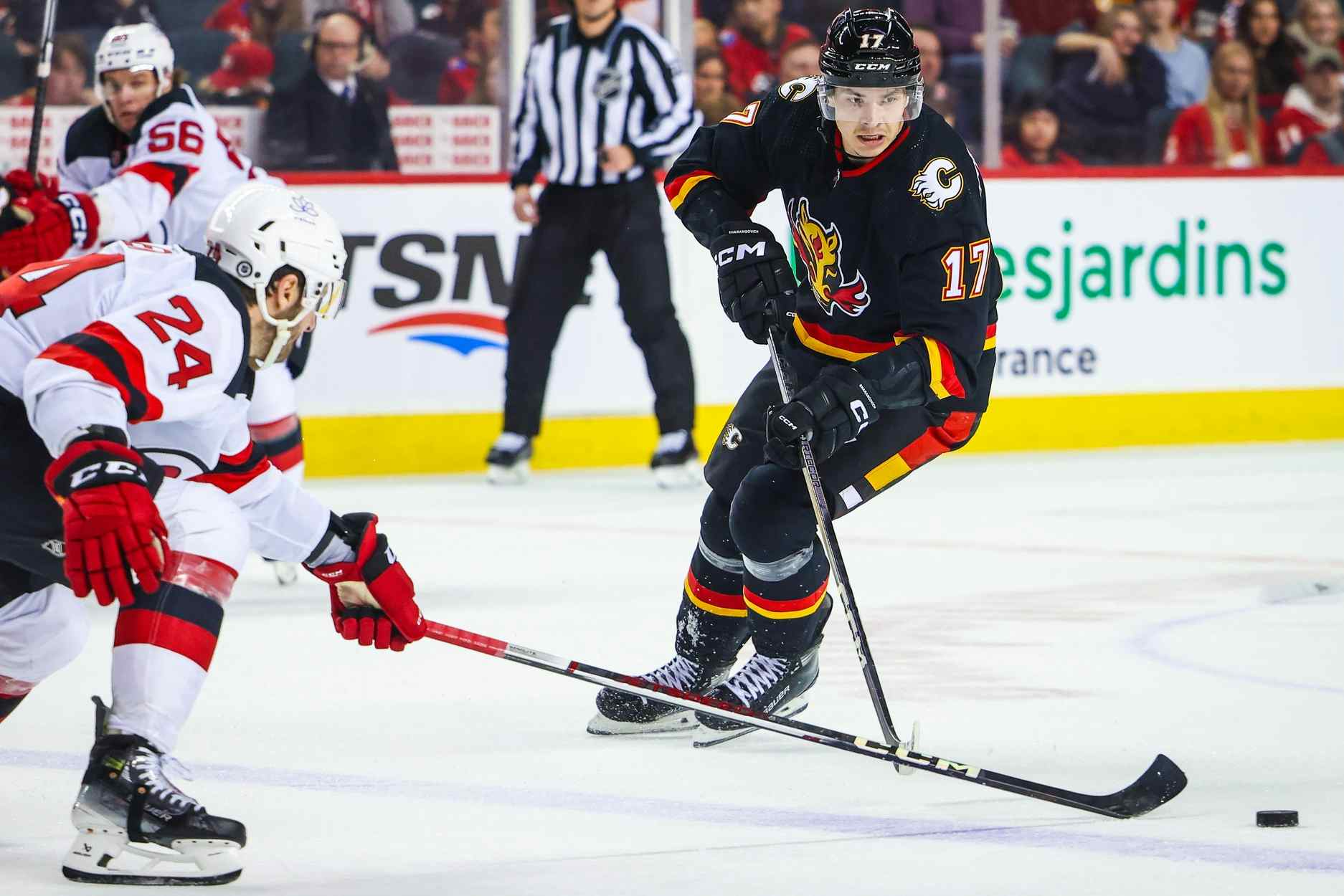Flames 4, Hurricanes 1 post-game embers: In the hunt

By Ari Yanover
6 years agoThe Flames had a great, solid game. They played well. They scored goals. Mike Smith stopped most of the pucks that came his way, and looked great the entire game. They were, quite simply, the better team, from top to bottom: and for that, they won their seventh straight game, and head into their bye week on a high note.
A tale of two hits
One reason to hit an opposing player is to separate him from the puck.
When Micheal Ferland hit Sebastian Aho in front of the Hurricanes’ bench, he did just that. Aho had the puck, Ferland hit him, Ferland got the puck, Ferland chipped it up to Johnny Gaudreau, and it ended up in the back of the net. Ferland is a physically tough player – he can fight, he’ll throw punishing hits – but he’s a very smart one, as well. We are, of course, several years removed now from rookie Ferland who hit everything that moved when the Flames played the Canucks in the playoffs; now we’ve got a Ferland who helped turn a hit into a goal.
Later, Mark Giordano hit Aho, and the result was nowhere near as good. Aho was injured, Giordano was kicked out of the game, and the entire situation devolved, taking two teams who were headed to the bye and putting the status of a really talented player on each into question.
Here’s the thing, though. Ferland’s hit created offence. Giordano’s hit was only to defend. Aho beat Dougie Hamilton, and Giordano was the next line of defence. He did what he had to: he hit Aho to separate him from the puck and take away a prime scoring chance. At the time, it was a 2-0 game and the third period had just started; Aho scores there, and suddenly, the Flames are on their heels. Giordano takes the puck away from him, and it’s a much safer Flames team in the third.
So to that end: I genuinely have no clue what Giordano was supposed to do in that situation. He stepped into him because he was looking to hit him. His shoulder was lowered. If Aho’s head is up, it’s a clean shoulder-to-chest hit. Aho’s head was not up, and that’s not Giordano’s fault. I am so loathe to blame the victim, but… that one’s on Aho. The only thing Giordano really could have done to avoid hurting him would have been for him to stop playing and let Aho walk in with a prime scoring chance. That was never going to happen.
Giordano being ejected is fine: he did hit a player’s head. But if you’re trying to take headshots out of the game, what do you tell Giordano to do differently in that situation? I don’t think there’s an answer for that.
Wonk the ice time
Two things threw this game a bit out of whack: Giordano missing almost an entire period, and Sean Monahan not being there at all.
Special teams really screwed this one, so I’m only looking at even strength ice times in this section.
Giordano played 12:54 on defence: the fifth most. The Flames went down a left-handed defenceman, and so, Brett Kulak rose up and left Michael Stone behind: he played 14:22, while Stone played just 10:16. Kulak played 2:37 with Travis Hamonic, and 1:45 with Dougie Hamilton.
You’d expect that T.J. Brodie would have gotten the most ice time, but you’d be wrong: he played 19:58, while Hamonic actually took the lead with 20:40. Hamilton only played 16:28. (Small sample size alert: 1:45 of that was with Kulak, and they had a 100% CF. Hamilton was 28.57% CF in his 2:02 alongside Brodie.)
On the forward end of things, of course Gaudreau (15:57) took top spot, and he was followed up by Sam Bennett (13:45) and Mikael Backlund (13:28). Though Bennett didn’t pick up any points, he filled in well with increased responsibilities, though he only played roughly an extra minute or two overall: Mark Jankowski played 12:19.
Depth?
A team losing its top line centre, even if for just a game, can be a pretty big blow, but the Flames handled it in stride.
Bennett is, evidently, no longer ideal as a centre. But because he’s played so many games at such a high level as a centre, he was an option to take over, without hurting the overall lineup. The Flames lost their top line centre and their lines were only minimally disrupted, and nobody really played all that much worse for it.
For example: Marek Hrivik looked solid in his Flames debut. The fourth line scored what was actually a rather nice goal. There were no blatant weak links in the lineup; it was just a solid game, top to bottom, with each line pulling its weight.
The things that can happen when everyone is capable of contributing. They won’t every single night, but having 12 forwards who can all take at least a regular shift really, really helps, particularly when a guy goes down and everyone else has to step up in his stead.
And Andrew Mangiapane didn’t look out of place reunited with his old AHL buddies. I’m not sure if that’s a sign of things to come – Monahan’s return bumps Bennett down, so someone has to get further bumped from there – but the team is at a point where they can afford to be slow and steady with Mangiapane, and it’s more important that pay off down the line than now.
Dougie Hamilton is really, really good
Hamilton probably deserved more ice time.
He scored twice. He had five shots on net. He leads the team with 137 shots on net (Gaudreau is second, with 128). And oh: his shooting percentage is now up to 5.8%, which is right in line with his 5.9% career average.
After the Flames’ win against the Ducks, I wrote:
Hamilton’s career shooting percentage is 5.6%. With the amount he’s putting the puck on net, he should have more goals (kind of like the Flames as a whole).
Well… looks like those goals are here. He’s up to eight on the season now, tied with Giordano for the team lead for defencemen.
And still, Hamilton only played 18:19 (all situations). Still, when Giordano was unavailable, Brodie was called upon to take his powerplay time. Still, Hamilton is not trusted to kill penalties (he played 1:13 on the kill, the least out of all Flames defencemen, including Giordano).
The lack of trust in Hamilton is honest to god baffling. He regularly plays on the top pairing. He regularly takes on the toughest assignments. He shoots more than anybody else, he has more points than any other defenceman, he’s on a five-game point streak including four goals in that time, three of which were game winners, two meaningfully so. He is, unequivocally, one of the Flames’ absolute best defencemen – and they’d be better off overall if he received the ice time that indicates just that.
And now we wait
The Flames have climbed up to second in the Pacific standings. They have also played more games (45) than any other team in Pacific contention, so grains of salt are required here.
In the ensuing five days off, their remaining division rivals will all get three games in. That’ll boost the Ducks to 47 games, the Kings to 46, the Golden Knights to 45, and the Sharks to 44. If the Flames are still in a divisional playoff spot by the time they play again Saturday, then you get excited about that. In the meantime, they’re still just fourth in points percentage, at .600.
Here’s the good news: they’re sixth in Western Conference points percentage. (Tenth league-wide.) Even with all of those games in hand, they are still, officially, in a playoff spot. It’s taken a seven-game win streak (and possibly counting), but they have looked good throughout it, just as they’ve looked good earlier in the season. But now the pucks are going in, both goalies are making saves, the defence has rightened itself, the call-ups are contributing, and they should be in the fight for home ice.
Things are going well. They’ll just have to remember to keep them going when they come back.
Recent articles from Ari Yanover





